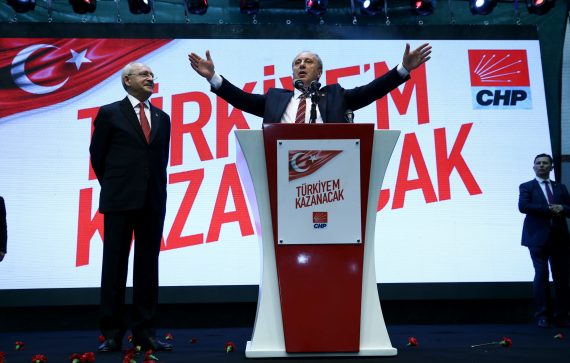Two weeks ago, I pointed out that the opposition parties have to decide whom they will nominate as their candidate for president in the upcoming elections and what their ambitions are regarding the elections on June 24. Now, it seems that at least the presidential candidate issue has been solved among the opposition parties. In the process of finding a presidential candidate, the most discussed option was to nominate a person who will run as a common candidate of all major opposition parties. However, several maneuvers and attempts to persuade each other ultimately failed, which then consequently caused a situation in which all opposition parties nominated their parties’ own candidate and even each party’s leader with one exception – the Republican People’s Party, CHP.
Even though CHP’s MP Muharrem Ince challenged the CHP’s incumbent chairman Kemal Kilicdaroglu, who lost eight elections in eight years, twice, he has been nominated as the party’s presidential candidate. Interestingly, Ince had stated during the last party congress in February that, “the CHP’s chairman is the party’s natural presidential candidate… If you want to rule the party while someone should rule the country, then, why are you the chairman?”
Nevertheless, it seems that in contrast to other opposition party leaders, the CHP chairman did not dare to compete as a candidate against the AK Party’s candidate, President Recep Tayyip Erdogan. While all major Turkish political parties nominated their de jure or de facto party leader as their presidential candidate, the CHP preferred a strange move that does not aim to win the elections but rather to guarantee Kilicdaroglu’s political future. It’s likely that the CHP leader does not want to risk his position as both a future MP in the new assembly and party chairman. Kilicdaroglu’s move to nominate Ince may though hamper his future ambitions. As Burhanettin Duran stressed, independent from the election results, Ince may cause serious troubles for Kilicdaroglu. Actually, it’s very unlikely – but – if Ince gains any success as a presidential candidate, he will directly try to control his party by challenging Kilicdaroglu’s one-man party leadership.
Besides these political anomalies among the left-nationalist secularists of Turkey, one statement by Ince during his speech at his nomination ceremony was striking. Ince said he would not only represent the CHP’s supporters but all of Turkey’s 80 million citizens. By this, Ince removed his CHP lapel pin to put on a Turkish flag pin as a symbol for neutrality by stating, “We will be impartial/unbiased. We will be independent.” On the other hand, he called his party supporters by saying, “This time we want the ruling power!” Consequently, all the CHP supporters echoed in the hall “power, power, power…”
Recommended
First of all, it’s quite absurd to have the ambition to win the executive presidency in a presidential system by stressing the party as “we want…” while on the other hand promising to be unbiased or impartial. Thus, the question arises as to how an unbiased president will appoint his ministers? Or even more concrete, how does a Kemalist MP since 2002 plan to rule the country without preferring his party fellows in the next five years and who will believe in these dubious statements?
Moreover, in both democratic presidential and semi-presidential systems, the head of state is the executive lead of the government, who, as a consequence, actively rules the country by following a concrete government program. For instance, neither Mr. Trump as an example of the presidential system nor Mr. Macron as an example of the semi-presidential system are impartial personalities. In addition, Mr. Macron is the de facto leader of his presidential party “En Marche!” holding the majority in the French parliament, too. Stressing an alleged unbiasedness to any party means that the party or the person has no concrete perception of what will be done in the next period.
As I already addressed above, the CHP has to decide what the party actually wants to achieve. Either winning the presidential elections –and the parliamentary majority– to govern the country under the new system by offering Turkish citizens a certain program, or, trying to bring back the old system in which previous presidents also used alleged “impartial” discourses, but preferred strong pro-tutelage positions. Nevertheless, at the end of the day, Ince may challenge the incumbent CHP leader Kilicdaroglu due to his –rather unlikely– limited success during the presidential election. This would be a miscalculation by Kilicdaroglu who wants to get rid of Ince by nominating him as the party’s presidential candidate. On the other hand, in the case of a rather obvious unsuccessful experience for Ince, that is to say, if the CHP loses the presidential race, Kilicdaroglu will most probably still stay in the new parliament as the party’s leader while Ince will quit his political career. The next month and a half will show us more.





